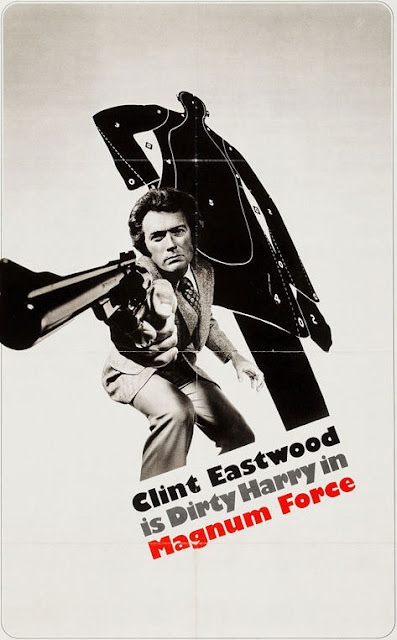Criminals are dying and Dirty Harry (Clint Eastwood) is not the perpetrator. Who is?
I remember watching scenes from this movie when I was younger. For some reason it was always on some TV channel, and I would catch another scene, and it was always the scenes featuring the motorcycle cops massacring people.
I know I saw more but those images of dark glasses beneath white helmets are very effective. Terminator 2 has really taken the iconography of the motorcycle cop, so there may have been some influence.
I watched Dirty Harry later, and while Magnum Force is not as good as that movie, it is pretty compelling.
Ted Post is the credited director, although apparently Eastwood held a tight leash on the production. Post is no auteur, but he has directed a couple of sequels which are memorable for their bleakness and violence.
While it might not be to the level of Peckinpah or Clockwork Orange, the violence in Magnum Force is still disturbing
There is an excessive quality to the movie - the set pieces are bigger, more people die, and the manner in which they do feels more unnecessary(?)
While Dirty Harry is considered an early action movie, Magnum Force feels closer to the real form - it’s story is pretty simple but it is mostly a collection of set pieces.
We even get the cliche of a villain killing someone in a despicable way so that we hate him more
Does the movie want us to identify with the cops, or Harry?
The movie is a reaction to the first movie, by having Harry against a group of cops who are more arbitrary in their execution of criminals.
The differences are threadbare, but the movie makes no real attempt to explore how Harry and the cops are similar or different. The reveal of the vigilantes identities does not lead to any greater conflict for Harry.
Magnum Force is a pretty sloppy movie, but the filmmaking and Lalo Schifrin’s score ensure it moves past the narrative bumps
The scenes of the vigilante cops are the selling point - as a daylight horror movie, Magnum Force is really good
Post/Eastwood frame the cops with tight closeups of their helmets or over their shoulders.
- the shots recall the looming close-ups of the highway patrolman Marion Crane runs into in Psycho, only more depersonalised. With Schifrin’s martial theme, they feel like robots coldly executing their mission.
These scenes pop the most in the movie - there is a care and attention to composition that the movie does not sustain in the other sequences.
There is a sense of focus and tension to Don Siegel's original that this movie cannot reach.
But in its own scattered way, Magnum Force retains a certain power - there is plenty of memorable moments and it benefits from the action genre's propensity for excess in the number and variety of action sequences.
If you are new to this blog, I also co-host a podcast on James Bond, The James Bond Cocktail Hour.
You can subscribe on iTunes, or wherever you get your podcasts.

No comments:
Post a Comment